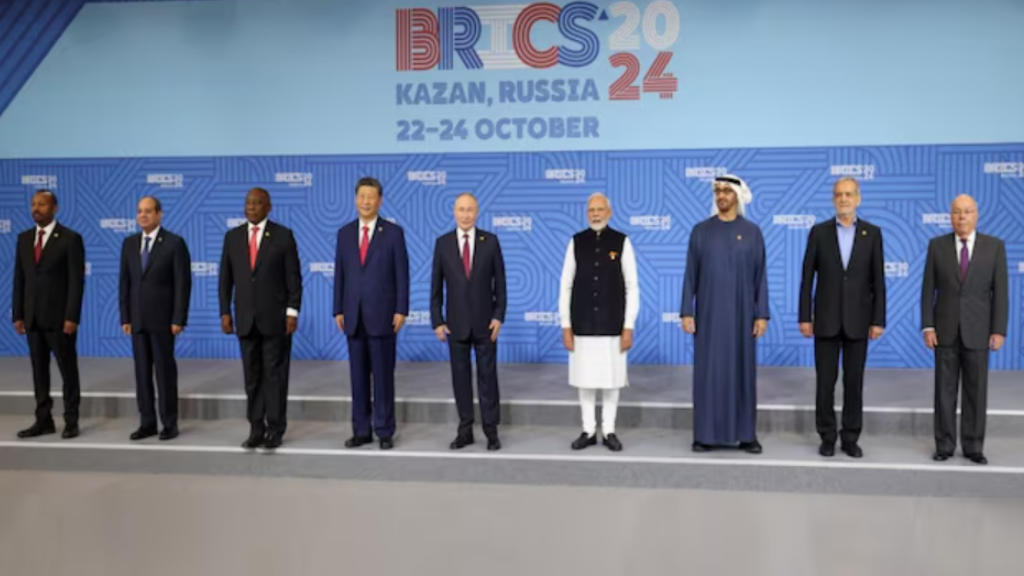The 2024 BRICS summit has concluded with a ‘Kazan Summit Declaration’, with 134 points covering 43 pages. The key topics include further development of the association, position on various global issues, sanctions, settlement of regional crises, including in Ukraine and the Middle East, in addition to a comprehensive reform of the United Nations (UN), including its Security Council.
These are the main points:
The United Nations
The BRICS Heads of State expressed their support for comprehensive reform of the United Nations, including its Security Council, with the aim of making it more democratic, representative, and effective. They also emphasized that the UN should play a key role in the global management of artificial intelligence. The UN Secretary-General was present at the BRICS summit, which we discussed here. We also discussed Russia’s plan for UN security council reforms here.
Sanctions
The BRICS Heads of State condemned politically motivated unilateral sanctions that undermine other countries’ development. This situation affects multiple countries and is not just limited to Russia. Full BRICS members China, (and Hong Kong), Ethiopia, and Iran, in addition to BRICS friendly nations such as Afghanistan, Belarus, Cuba, DR Congo, Iraq, Lebanon, Libya, Mali, Myanmar, Nicaragua, Sudan, South Sudan, Syria, and Venezuela are all currently subjected to US sanctions. They expressly stated that “We are deeply concerned about the disruptive effect of unlawful unilateral coercive measures, including illegal sanctions, on the world economy, international trade, and the achievement of the sustainable development goals. Such measures undermine the UN Charter, the multilateral trading system, the sustainable development and environmental agreements. They also negatively impact economic growth, energy, health and food security exacerbating poverty and environmental challenges.”
Conflicts
The BRICS leaders expressed concern about “the rise of violence and continuing armed conflicts in different parts of the world including those that have significant impact at both regional and international levels.” They reaffirmed their “commitment to the peaceful resolution of disputes through diplomacy, mediation, inclusive dialogue and consultations in a coordinated and cooperative manner.” That in part is a reference to previous Ukrainian-led ‘peace summits’ which have excluded Russia, and is now seen as non-viable. . The Kazan Declaration did not formulate any specific opinion about the Ukraine conflict, although there were veiled references to Ukraine being unwilling to discuss any type of peace process with Russia.
The BRICS leaders also expressed concern over the escalation in the Middle East, and were especially concerned with the recent Israeli attack on the Iranian embassy in Damascus. The terrorist attack on Lebanon involving the use of communications equipment, including pagers, was also condemned.
The leaders supported the establishment of the sovereign State of Palestine within the internationally recognized 1967 borders and its admission to the United Nations.
The BRICS countries “noted with satisfaction” the various Chinese, Turkish and Russian proposals to settle the Ukrainian conflict, and noted national sovereignty and security positions on the issue. This implies that a political and security consensus amongst non-European countries is being arrived at in terms of settling the Ukraine conflict.
Combatting Terrorism
The BRICS countries strongly condemned terrorist attacks on cross-border energy infrastructure and called for unbiased investigations. The leaders opposed the politicization of cooperation in combating transnational crime. The former is a reference to the unsolved explosions, and Western lack of investigative cooperation, in the explosions that destroyed the German Nordstream pipeline off the coast of Denmark and Sweden in the Baltic Sea.
Iran Nuclear Deal
The BRICS leaders called for the revival of the Joint Comprehensive Plan of Action (JCPOA) on Iran’s nuclear program, which the United States has so far rejected under Israeli objections.
Global Economy
The BRICS nations advocated reform of the Bretton Woods institutions by enhancing the contribution of developing countries to the world economy. They endorsed an open and fair multilateral trade system with a central role for the World Trade Organization (WTO) providing a special regime for developing countries.
The BRICS countries supported the Russian initiative to establish a Grain Exchange to cover other agricultural sectors in the future.
The leaders called on developed countries to fulfill their obligations to help nations in need.
The BRICS countries also agreed to discuss and study the possibility of establishing an independent cross-border BRICS Clear settlement and depository system.
Summary
It is still early to comment on some the implications over what has transpired at the BRICS summit although no doubt further details will emerge. The final point, concerning the ‘BRICS Clear’ settlement and depository system is well worth immediate attention, as this implies the creation of a BRICS Central bank. We discussed the potential for the BRICS New Development Bank to undertake this role here yet see it as an unlikely candidate given its existing role. If correct, this suggests that further financial institutional development within the BRICS bloc may well be imminent.
Russia’s Pivot To Asia have made the complete Kazan Declaration available as a complimentary PDF file that can be downloaded here
To keep in touch with the latest developments please either subscribe to our complimentary weekly round up here and follow us on X (Twitter) here.
We will provide a detailed analysis of the complete contents of the Kazan Declaration shortly.
Further Reading
BRICS Pay Launches, Will Be A Global Payments Game Changer
Continue Reading





 Русский
Русский









